Month 3:22, Week 3:7 (Shibi'i/Sukkot), Year:Day 5946:81 AM
2Exodus 9/40, Omer Count: 7 Sabbaths + 14/50 days
Gregorian Calendar: Tuesday 21 June 2022
Book of Revelation XXI
The Glory of the Throne Room III
The Four Living Creatures Part B
(Revelation 4:6b-11)
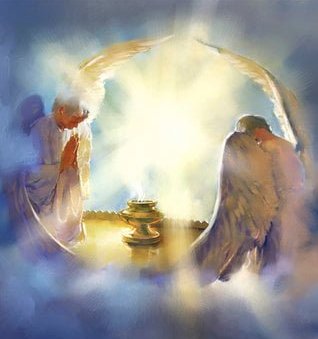
Continued from Part 21
Introduction
Shabbat shalom kol beit Yisra'el and Mishpachah, welcome back to the 21st part of our study of the Book of Revelation. My apologies for the last session being so long as we had two weeks' worth of material to cover. This one should be a bit shorter!
The Importance of the Seraphim
Because there is so much to be discussed on the Seraphim, Zoa or 'Four Living Creatures', and since they appear to be intimately linked to the Cherubim too, we have had to cast a wide net in the Scriptures in order to assemble the puzzle on them so we can see clearly who or what they are. Their importance lies in the fact that they are, as it were, the bridge between the heavenly realm and the earthly, and specifically, to creatures represented by the three major categories of terrestrial animal as far as spiritual characteristics are concerned: the King of the Jungle or lion, the King of the Tamed Beasts or ox, and the King of the Birds or eagle. The fourth category is man himself as a physical creature. All four are represented as the faces or characters of these Created Ones, their actual bodies being like that of a man with the exception that the feet are represented as hooves (like those of beasts of burden) and, of course, they possess three pairs of wings (or two, depending what rôle they are performing) for they are also associated with the Throne of Yahweh in a number of capacities, as we saw last week when we read through parts of Ezekiel and Isaiah. That all four had a mostly anthropomorphic body that resembled that of a man suggests a link both to man as the designated steward over nature, and Yahweh Himself in whose image man was made. You might say, then, than man is theomorphic, or 'shaped like God', at least on an inferior plane of existence.
Worship and Music
What we see happening in the Throne Room is what ought to be happening here on earth in the Messianic Community (Church). Last week, and the sabbath two weeks before that, I stressed the importance of worship or declaring the worth-ship of Elohim (God) because this is the central human activity that enables us to make sense of everything else. Without it, our perspective will always be skewed. I have no doubt you have all experienced different forms of worship in different denominations, as I have from the formal Anglican liturgy to wild charismatic displays. Is it true we should just select whatever type of music suits our 'temprement' and choose a denomination accordingly? I hope nobody believes that. Though music varies a tremendous deal from culture to culture, and sacred music from generation to generation, there was little controversy until relatively modern times, from the middle of the 20th century. Churches tloday are as divided over worship music as they are over doctrine. At this stage we are not interested in all that controversy. What interests us now is whether the worship is qadosh (holy) or not. How are we to know?
The Abundance of Holiness at the 2015 Dedication
I want to remind you once again of what happened in the 2015 Dedication of the Remnant of Messianic Israel because what distinguished that from all other assemblies we have ever had was the HOLINESS that was experienced. From 20 March to 4 April 2015 we had one of the most intense spiritual experiences we have ever had as a body. You should read the Ten Testimonies of the participants from 5 April to 15 April 2015 too. One of the conference attendees testified: "I have never experienced such HOLINESS in my entire walk with Elohim!!!"
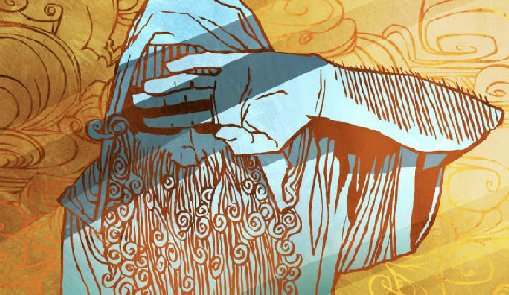 Yahweh wants you to experience His holiness
Yahweh wants you to experience His holiness
Azotus Travel and the Elijah Prophets
The 2020 Dedication of the Melchizedek Priesthood was also vitally important landmark too even if it was in the middle of the Covid crisis and few were able to attend. I mention these dedication assemblies because we are about to move from dedication to implementation but before that happens we must understand the divine tavnith or pattern of true worship. And to do that we must become acquainted with the 24 Elders and the 4 Seraphim and especially the latter for they hold the key, amongst many others, to 'Azotus travel' which we will be needing soon. All the Elijah Prophets possess it and we must at some point return to the interrupted series of sermons that we started on 27 January 2021 entitled, Return of the Elijah Prophets which we broke off on 3 May of that year with Yahweh reminding me in a vision which I shared in a recent sermon this year, on 8 May, entitled, Remnant Gathering: The Call of the Elijah Prophets, because their training/preparation must soon begin.
Praise as Celebration of the Elements of Creation
We have so much to learn about the heavenly places like the Throne Room and what happens in there, how praise and worship work and are the life blood, as it were, of the very Engine Room of the Universe - the Throne Room of Yahweh-Elohim. We must therefore ask ourselves some important questions: do we, in our private prayers and worship, and in our public services, give sufficient weight to praising Yahweh as the Creator of all things? Do we allow ancient poems like the Song of the Three Men in the fiery furnace (Dan.3) to inform and colour our praises, so that we consciously celebrate with all the different elements of creation? Are we a part of the worship of the 24 Elders and the 4 Seraphim or are we doing something else apart from them? What are the elements of creation? Do we view creation itself as a theatre of praise, and live appropriately with such an awesome place? Now that we have the Hubble, James Webb and other powerful telescopes in space displaying for us the amazing created and ever changing universe out there, is our worship informed by the pictures they are sending back to us? What about our gardens, fields, woodlands, jungles, mountains, lakes and rivers? The variety is astonishing! We're coming back here to earth, you know, when it is glorified, and we'll be here forever. It's amazing just how many people never look up or around at the planet's wonder. With summer here in the northern hemisphere, there is so much to praise Elohim (God) for just in our gardens.
Rightly Informed Praise
In particular, are we conscious of our vocation to worship with a 'because'? In other words, do we allow our thinking about Yahweh to inform our praise? Do we think through the fact that He deserves 'glory, honour, and power' as we proclaim in our Liturgy of the Master's Supper? And are we being informed by reality - the reality of who Yahweh is, what He has done, is doing, and is about to do - and not by fantasy in our worship? In other words, are we defining Yahweh accurately and scripturally, or are we modifying Scripture in our minds to suit our own prejudices and expectations?

Between Worshipping the Creator and the Creation
Now these may seem obvious, even facile, questions but think carefully on this: the world has been full of movements, systems, philosophies, and religions that have ignored creation as shabby, or irrelevant to 'spiritual life', or that have vilified it as a nasty, dark and dangerous place, full of evil and death. Equally, and more so today in the wake of rejecting Christianity, the world has been full of movements which, instead of worshipping the Creator-Elohim (God) who made the world, have worshipped the world itself, or forces within it such as money, sex, war and power? The Book of Revelation, as we are seeing, and will see, sets out the delicate but decisive balance. All creation worships Yahweh-Elohim, even inanimate things, hard though I realise that may be for the Western mind to comprehend, and the Seraphim are very much tied in with that too. We humans are called to worship Elohim (God) with mind as well as heart, recognising that He is worthy of all praise as the Creator of all things.
The First of the 17 Heavenly Utterances
With this in mind, let's return one last times to Revelation 4:6b-11 and to the heavenly utterances of the Seraphim or Zoa, beginning at verse 8:
"And the four Zoa/Seraphim, each of then with 6 wings, are full of eyes all around and inside. Day and night without ceasing (rest) they sing, 'Holy (qadosh), holy (qadosh, holy (qadosh, Yahweh-Elohim Almighty, who was, and is, and is to come (coming)" (Rev.4:8-9, NRSV).
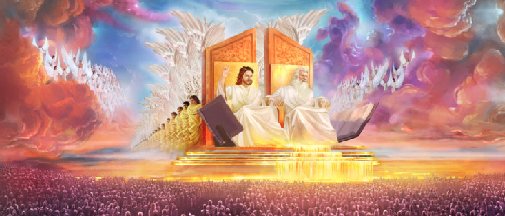
Yahweh's Reputation
This is extremely important. Why? Because this is the first of 17 heavenly utterances. These first words are what greet the human ear telling us that which is of the utmost importance for us to both know and do. Before you learn anything else about heaven and Heaven's Ruler, you need to know this. And the first heavenly utterance begins with Yahweh Himself and relates to what He is in Himself, and not to what He has, or has done, or is going to do. The emphasis is on "who was" because it was put first. In all our doings with the Creator we begin with what He is and this because of what He has already done. In other words, His reputation.
Opening the Books
The testimony of any man's or woman's character is his or her past track record. He is what He is, and what He always will be, because of what He has already done because we can expect more of the same in the future. The object of the whole Book of Revelation, and indeed the whole scriptural record, is to establish the Holiness of Elohim (God), and to know that, you need to know of His past deeds. And therefore this is the first thing that is proclaimed. Similarly, near the very end of the Book of Revelation, when "the books are opened" to see who is recorded in the "book of life", "the dead were judged according to what they had done as recorded in the books" (Rev.20:12, NIV). But before the Judge orders our books to be opened in order to judges us, He first invites us to open His book and witness His deeds of old. That's one of many reasons we have the Bible. Thus we may know that He who judges is worthy to judge; and since He is worthy, He is worthy of our worth-ship or worship too. So the holiness of Elohim (God) is proclaimed at the outset, not simply as an intellectual proposition, but on the basis of His record. And it's all here in His book. He therefore has every business doing what He does and we are given the proof. He is just and merciful and kind.

Bringing the Kingdom to Earth
Here, then, in the Book of Revelation, the reign of Heaven is about to be established in the Earth by joining the two together, when all shall be qosdesh or holy, whereas now - in the present - all on the earth is unholy and therefore separated from Him. What is here is filthy and Yahweh cannot dwell in it but only in purified temples of flesh - the bodies of the redeemed - and in those sacred places where the redeemed congregate or assemble. That is why we consecrate, and seek purification of, our homes and places of worship, making them sacred space where the Divine can manifest freely. And that is why we all have the same thought, the same desire, the same yearning, in the great Kingdom Prayer:
"Our Father which art in heaven,
Hollowed (Holy, Qadosh) by Thy Name,
Thy Kingdom come,
Thy will be done on earth as it is in heaven" (Mt.6:9-10, KJV).
The Holiness Inherent in the Divine Name
If our prayers don't spontaneously begin there, we're tuned into the wrong spiritual wavelength, my friends, because that is the default perspective and all-consuming desire of the born-again in Christ! And what is that persepctive? What informs - or ought to inform - our praying? It is the knowledge of the holiness or sacredness of the Divine Name, Yahweh, which is an encapsulation of, and signpost to, His character, and the desire that heaven should come down to earth, entirely removing the present evil system, and staying. And if we are sincere in that desire, then we will have been informed by the life that is the Throne Room. This means that all who dwell in it - Yahweh, Yah'shua (Jesus), the Seven Ruachot (Spirits), the 24 Elders, the 4 Seraphim, the Divine Council, and so on, represent for us all that is supremely desirable and good. Is that not good enough reason to spend lots of time learning about it, to make sure our heart is matched with that of the heavenlies which we are importuning to come down and dwell with us in the Master's (Lord's) Prayer?
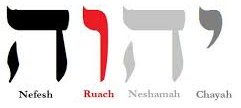
We, not I - Us, Not Me
Whatever ambitions you may have on earth must take a firm second place to this quest for the Ultimate Reality. Please carefully note the 'our' in "Our Father" and the 'us' and the 'our' in "Give us this day our daily bread..." in the next line of the Master's Prayer (v.11). If our prayers are about 'I' or 'me' first of all, then we have missed the goal or mark entirely; and 'missing the mark', as you know, if the definition of the word 'sin', because from the fourth annual festival of Shavu'ot (Weeks, Ekatost) onwards, four of these festivals are corporate, communal, family, tribal or national, as I have been teaching you for years.
The Godhead as Holy Family
To be in the Throne Room, which is the object of all authentic worship, is to have corporate Body-of-Christ consciousness, an awareness that this ambition - this hope to be in heaven - is primarily within the context of a wider divine family. That is why the Elohimhead or Godhead isn't some mystical (and incomprehensible 'Trinity') but a HOLY FAMILY consisting of the Creator and His Family and the Redeemed of Creation and their families, who are thereafter joined to His. The transformation of the human from mere creature to sanctified elohim (with a small 'e'), by dying to self and becoming progressively more and more Christ-like, the Eastern Orthodox call Theosis and as far as I can tell they're the only denomination who have understood this truth (the Mormons go to the blasphemous extreme of claiming we become gods, or the Charismatics who say the saved are automatically 'godlets' just by believing).
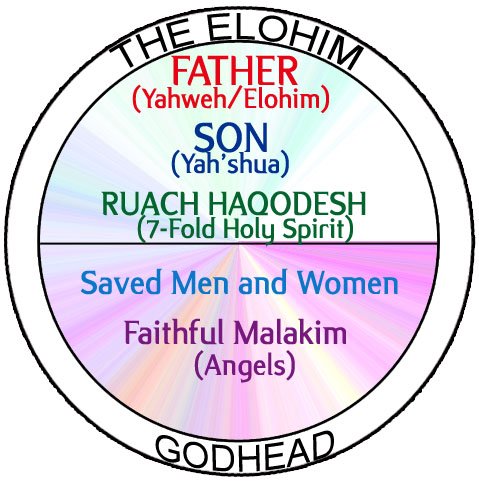
From One to Many, Always
Read the rest of the Master's (Lord's) Prayer - the model prayer taught to us by the Saviour - and you will see it is corporate from beginning to end. There isn't a single reference to 'me' or 'I' in it. Which is not, of course, to say that the self is unimportant or doesn't have legitimate needs, just as a baby or a child does (I often call them 'egos on legs'!), but it does mean that there's a natural (and necessary) growing up or maturing stage in our spiritual development where group-consciousness is not only important but absolutely essential in the end in order to be complete or whole because that's what, or who, the Bride is. Heaven isn't just a soup of individuals milling around meeting their own personal needs, as we might suppose. You see, the Bride of Christ isn't just a collection of individuals each doing their own thing (though there's an element of that) but a 'Uniplural Family' or 'Whole' (and to be 'holy' is also to be 'whole' or complete). Have you ever wondered why Yahweh 'permitted' polygamy in the Tanakh (Old Testament)? Well, that's the prime reason. It wasn't an oversight on His part to accommodate weakness on the part of men (pity the women if that were the case) - He didn't, as an American brother once remarked, have a sudden bout of 'Alzheimer's'. Well, the prime reason is the corpotate nature of both salvation and the heavenly reality. Whereas the first three annual festivals of Israel may be said to be 'individualistic' or 'monogamous', as it were, the last four (plus the eighth one in Shemini Atseret) are 'communal' or 'polygamous', as it were. Nothing that Yahweh commands or permits is accidental - nothing is without purpose and glory. He isn't negligent and He doesn't make mistakes. And He isn't an evolutionist.
The Skewed Greco-Roman Interpretation of the Gospel
Yes, we're saved individually, as evangelicals teach (the first three festivals) (the monogamous Bride) but we must also be saved as a 12-Tribed National Family (Messianic Israel) (the polygamous Bride), but the latter isn't possible until self is properly dead and Christ is living fully within us. So you see, the ancient form of marriage, so scorned and derided by Western Roman and Eastern Greek Christians alike (thanks to the anti-Hebraic Greco-Romanising influence on the development of the Western and Eastern Churches), isn't some primitive left-over which we well-and-truly got rid of over the last 1,500 years in Europe and abroad, thanks to our having socially 'evolved' into something 'higher' or 'better' than our spiritual ancestors (look at the sorry state of the West today) - it's a reflection of ultimate spiritual reality, to which men with a shem tov or good reputation (name) are at times called to incarnate as the living reality of the heavenly sphere which is the Throne Room (Is.4:1). That's why there are Seven female Ruachot (Spirits) in the Throne Room, not just one male one as in the skewed Greek- and Roman-influenced Trinitarian creeds. She is 7-in-1 just as the Elohimhead (Godhead) as a whole is 3-in-1 and as the Body of Christ is millions-in-one, or echad (unified).
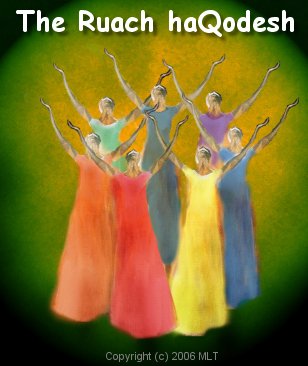
Three Psalms Anticipating the Earthly Reign of Yahweh
It is remarkable also that there are three Psalms which anticipate or proleptically speak of the coming Reign of Yahweh-Elohim. I am referring to Psalms 93, 97 and 99 which we're going to end today's study with. The three Psalms which come before these three (92, 96 and 98) commence with the mitzvah (command) to sing, and then these Psalms which follow each begin with, "Yahweh reigns" (NKJV, NIV, ESV) or "Yahweh is King" (NRSV, NEB, NLT). One day this will be true on earth as it is in the heavenlies, when they will become a present reality here on earth too, even if He truly reigns in the hearts of the authentically saved on earth in the here-and-now. The heavenly utterances in the Book of Revelation begin with the proclamation of this holiness because those who say, "Qadosh, qadosh, qadosh!" or "Holy, holy, holy!" are about to call for the judgments which are to bring in that coming Qadosh or Holy Reign of the Great King on earth (Is.23:18; Zech.14:20-21). Those three Psalms must be carefully read in the light of the Apocalypse.
Psalm 93
Let's take a look at them now beginning with Psalm 93 - they're very short.
"Yahweh reigns, He is clothed with majesty;
Yahweh is clothed,
He has girded Himself with strength.
Surely the world (olam) is established, so that it cannot be moved.
Your throne (kesay) is established from of old;
You are from everlasting.
The floods have lifted up, O Yahweh,
The floods have lifted up their voice;
The floods lift up their waves.
Yahweh on high is mightier
Than the noise of many waters,
Than the mighty waves of the sea.
Your testimonies (witnesses) are very sure;
Holiness adorns Your house,
O Yahweh, forever (le-olam-va-ed)"
(Ps.93:1-5, NKJV).
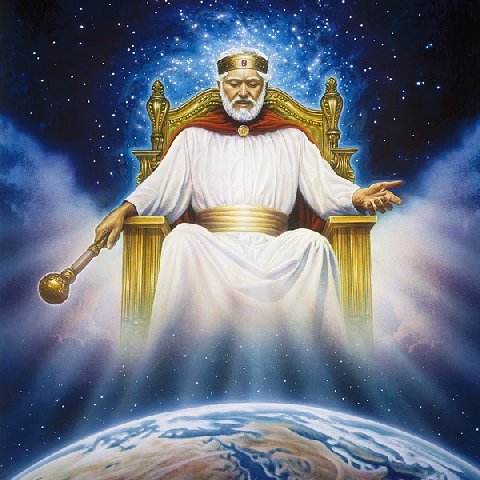 Yahweh reigns!
Yahweh reigns!
Called for by the Psalm of the Sabbath
This Psalm is called for by the one before it (Ps.92) known as the 'Paslm of the Sabbath'
which speaks of millennial Sabbath-keeping which is to come (which is itself pretty overwheming evidence that the Sabbath was never abolished in the New Covenant). It tells of the destruction of the wicked, the perishing of Elohim's (God's) enemies and the scattering of the workers of iniquity, before Yahweh is exalted as El Elyon or the 'Most High' for evermore. Then comes the answer in Psalm 93, which begins: "YAHWEH REIGNS,", and tells of the Throne being established, and ends with the declaration, "holiness adorns Your House, O Yahweh, forever."
Flat Earth Silliness
By way of a side-note, flat-earthers love to cite Psalm 93:1, "the world...cannot be moved" as evidence that the earth is stationary and showing their complete ignorance of Hebrew. What this passage means is that the Creator will not allow the earth, which He has painstakingly made and staked His reputation on, will not be destroyed or fail to accomplish the purpose for which is was created. Thus we could say, using the same language, that 'Yahweh will not be moved' either, because He reigns as Absolute Sovereign, but it doesn't mean He is forever stationary.
 The earth is not fixed or immovable as in 'stationary' (and isn't flat either)
The earth is not fixed or immovable as in 'stationary' (and isn't flat either)
Psalm 97
The second Psalm is 97:
"Yahweh reigns;
Let the earth rejoice;
Let the multitude of isles be glad!
"Clouds and darkness surround Him;
Righteousness and justice are the foundation of His throne.
A fire goes before Him,
His lightnings light the world;
The earth sees and trembles.
The mountains melt like wax at the presence of Yahweh,
At the presence of the Master of the whole earth.
The heavens declare His righteousness,
And all the peoples see His glory.
Let all be put to shame who serve carved images,
Who boast of idols.
Worship Him, all you gods.
Zion hears and is glad,
And the daughters of Judah rejoice
Because of Your judgments, O Yahweh.
For You, Yahweh, are most high above all the earth;
You are exalted far above all gods (rulers, powers).
You who love Yahweh, hate evil!
He preserves the souls of His qodeshim (saints, set-apart ones);
He delivers them out of the hand of the wicked.
Light is sown for the righteous,
And gladness for the upright in heart.
Rejoice in Yahweh, you righteous,
And give thanks at the remembrance of His qadosh (holy, set-apart) name (or 'holiness' - KJV, lit. 'for the memory of His holiness')"
(Ps.97:1-12, NKJV).
The Millennium Glory & an Acrostic
This Psalm is also called by the previous one in Psalm 96:1:
"O, sing to Yahweh a new song!
Sing to Yahweh, all the earth"
(Ps.96:1, NKJV).
and speaks of the Millennium glory, which is summed up in verse 11 of that same Psalm:
"Let the heavens rejoice, and let the earth be glad" (Ps.96:11, NKJV).
What is not obvious in the English translation is that the four Hebrew words that form this verse are an acrostic. What that means is these four Hebrew words begin with the four letters of the Name of Yahweh (the Tetragrammaton), or YHWH! Why is that important? Because it means that this verse is stamped as containing the result of Yahweh's dealings. There are hundreds of evidences of the inspired nature of Scripture hidden in the Tanakh (Old Testament) which get lost whenever they are translated into another language which is why you should never allow yourself to harrassed by false translators and editors of the Bible who refuse to include explanatory footnotes, flasely claiming that this is 'adding' to the Bible. On the contrary, in such a matter as an acrostic, this constitutes subtracting from it. Those who produced the Halleluyah Scriptures are guilty of this.
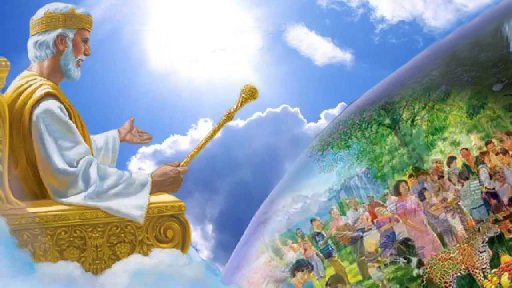 The glory of the millennial earth
The glory of the millennial earth
For the Memory of His Holiness
"Let the heavens rejoice, and let the earth be glad" is also the burden of the final heavenly utterances in Revelation 19:
"Then a voice came from the throne, saying, 'Praise our Elohim (God), all you His servants and those who fear Him, both small and great!' And I heard, as it were, the voice of a great multitude, as the sound of many waters and as the sound of mighty thunderings, saying, 'HalleluYah! For Yahweh-Elohim Omnipotent reigns! Let us be glad and rejoice and give Him glory, for the marriage of the Lamb has come, and His (uniplural) wife has made herself ready'" (Rev.19:5-8, NKJV).
Then, as we have just seen, comes the answer in Psalm 97, which begins, "YAHWEH REIGNS,", and tells how "righteousness and justice are the foundation of His throne" (v.2; cp. Rev.15:3; 16:7; 19:2), and goes on to speak of the very judgments which are described in John's Apocalypse, and also of the exaltation of Yahweh high above all the earth (v.9; cp. Ps.92:8). It ends by calling on the righteous to "rejoice in Yahweh...And give thanks for the memory (in remembrance) of His holiness" (Ps.97:12)
The Third Calling
The third and final Psalm (99) is called for in Psalm 98:
"O sing to Yahweh a new song!
For He has done marvelous things;
His right hand and His qadosh (holy, set-apart) arm have gained Him the victory.
Yahweh has made known His salvation;
His righteousness He has revealed in the sight of the nations.
He has remembered His mercy and His faithfulness to the house of Israel"
(Ps.98:1-3, NKJV).
Psalm 99
Then comes the answer in our third and final Psalm:
"Yahweh reigns;
Let the peoples tremble!
He dwells between the cherubim;
Let the earth be moved (lit. 'stagger')!
Yahweh is great in Zion,
And He is high above all the peoples.
Let them praise Your great and awesome name --
He is qadosh (holy, set-apart).
"The King's strength also loves justice;
You have established equity;
You have executed justice and righteousness in Jacob.
Exalt Yahweh our Elohim (God),
And worship at His footstool -- He is qadosh (holy, set-apart).
"Moses and Aaron were among His cohenim (priests),
And Samuel was among those who called upon His name;
They called upon Yahweh, and He answered them.
He spoke to them in the cloudy pillar;
They kept His testimonies and the ordinance He gave them.
"You answered them, Yahweh our Elohim (God);
You were to them Elohim-Who-Forgives,
Though You took vengeance on their deeds.
Exalt Yahweh our Elohim (God),
And worship at His qadosh har (holy hill);
For Yahweh our Elohim (God) is qadosh (holy, set-apart)"
(Ps.99:1-8, NKJV).
Why Thrice 'Holy'?
Once again, the Psalm begins: "YAHWEH REIGNS" or, as other translations put it, "Yahweh is King; Let the peoples tremble! He dwells between the cherubim; Let the earth stagger!" No less than three times we find the three-fold 'Qadosh' or 'Holy' ('Set-Apart') of the Seraphim or Zoa in Revelation 4:8 - these three Psalms give us their interpretation and significance - yes, we now know why 'holy' is repeated three times:
- 1. Verse 3: "Let them praise Thy great and terrible Name: for it is qadosh (holy, set-apart)" (KJV);
- 2. Verse 5: "Exalt ye Yahweh our Elohim (God), and worship at His footstool, for He is qadosh (holy, set-apart)" (KJV); and
- 3. Verse 9: "Exalt Yahweh our Elohim (God), and worship at His qadosh har (holy, set-apart hill); for He is qadosh (holy, set-apart)."
Name, Footstool and Hill
So to make plain: Yahweh is thrice qadosh or holy not just because He Himself (and therefore His Name Yahweh) are qadosh (holy, set-apart) but also '3' is the number of divine perfection, He being perfect (to which we also have been called by Yah'shua/Jesus - Mt.5:48; 19:21, cp. Heb.11:40). We therefore affirm His holiness in three main ways:
- 1. By praising His Name 'Yahweh' (not 'Lord', Jehovah or some other man-made name);
- 2. By worshipping Him "at His footstool"; and
- 3. By exalting Him by worshipping Him "at His qadosh har or holy (set-apart) hill".
Understanding the Three Worthship Elements
All this emet (truth) and teaching or Torah is embraced in this first heavenly utterance spoken by the four Seraphim or Zoa, hence its supreme importance in worship. As should by now, I hope, be obvious, understanding these three worth-ship elements, and especially now in the B'rit Chadashah or New Covenant, is critically important. Let's take each one in turn.
1. The 'Great and Terrible' Name of Yahweh
Firstly, Yahweh's NAME, and by that is meant His Character which is described as being both "great" and "terrible". It is 'great' because it informs us of the scope or cosmic dimension of who He is. That's why I mentioned the Hubble and James Webb telescopes earlier to give you some idea of how huge His domain is. Whether you are peering down through a microscope and seeing the incredible complexity of even the simplest of all living cells, or whether you are looking at the amazing images of planets sent us by such spaceships as Voyager 2 or of whole galaxies as shown us by the mightiest telescopes, you should be overwhelmed at His greatness. And that's just the physical universe - what about the vast spiritual reality about which we still know so little? We are like fragile cosmic poppys by comparison. That's pretty frightening seen objectively - so small yet so cherished by the Creator.
Positive and Negative Fear
This phrase, "great and terrible" isn't only used to describe Yahweh but also the Sinai wilderness (Dt.1:19); the Hebrew word tare' (which we render 'terrible') contains a multiplicity of meanings as that which provokes a mixture of fear and reverence. This legitimate positive and reverential fear of Yahweh is to be distinguished from, and contrasted with, the negative counterpart which is a pathological and even satanic slavish fear. These two concepts are oftentimes not properly distinguished which has led to all sorts of theological abuses by both ignorant Bible students and by those who ought to know better - because they are learnèd - who cultivate the negative kind of fear in order to keep people in bondage to the more easily control them, as they suppose. (It's a reason I avoid the implicent threatening of hellfire-preaching when it isn't properlly balanced with Yahweh's love for us). If you want to understand the positive kind better, read through the end of the Book of Job. Sadly, there is very little true fear of Elohim (God) nowadays, even amongst Christians, which we might otherwise usefully imitate. So think, rather, of Isaiah's reaction to His uncleanness before the Throne of Yahweh that we recently discussed, and of why he was fearful.
2. The Footstool of Yahweh
Secondly, worshipping at Yahweh's "footstool". What is that? Literally, a footstool or ke'vesh is a low stool designed to serve as a rest or support for the feet when the individual is seated. You have seen the older folks use them a lot, I'm sure. The golden footstool of Solomon's throne was a ke'vesh (2 Chr.9:18). Another expression, used six times in Scripture, is hadhom' ragh-layim or 'stool of the feet' and is used figuratively to refer to the temple (1 Cor.28:2; Ps.132:7; Lam.2:1) and is the one used in Psalm 99:5 that we just read. A third meaning is the earth itself (Is.66:1). Finally, a fourth usage of the term is in reference to enemies being crushed by Messiah's rule or reign (Ps.110:1). There are parallel references in the Messianic Scriptures (New Testament) where, for example, James reproves those practicing class distinctions in the congregation, using the illustration of a poor man being told, "Stand back, or sit here before the footstool" (Jas.2:3, HRV). All other references to footstools are from the Tanakh (Old Testament) (Mt.5:35; Ac.7:49: Lk.20:53; Ac.2:35; Heb.1:13; 10:13).
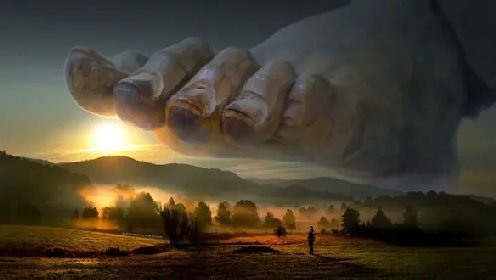 The earth is the footstool of Yahweh
The earth is the footstool of Yahweh
Containing the Infinite in the Finite
The earth is Yahweh's footstool metaphorically-speaking. Thus His Tabernacle, which we have spoken a lot about, is where His metaphorical 'feet' are. And you will remember that in washing the feet of His talmidim (disciples), Yah'shua (Jesus) indicated that their whole bodies were rendered clean (Jn.3:10). The point of the footstool imagery is to remind us of His greatness and our smallness. Add to that the undoubted fact He cannot reveal His whole glory down here else the earth would burn up (as indeed we know one day it will be when even the elements melt at the planet's final glorification after the Millennium - 2 Pet.3:10,12), Solomon also reminding us that a physical structure like a Temple could not contain Him anyway (1 Ki.8:27; 2 Chr.6:18).
New Covenant Temple Worship
So how do we worship in the Tabernacle or Temple today? In the New Covenant we worship Yahweh by, and through, the Ruach haQodesh (Holy Spirit) in our physical bodies (1 Cor.6:19) which, because of Messiah's atoning work on the Cross, means we no longer require either a physical temple or the Levitical priesthood system of animal sacrifices that formerly administered it. But in the same way the temple of stone had to be maintained in a high level of purity, so too must we now do the same with our physical bodies if the Ruach (Spirit) is to dwell in us and direct our praises to the Father through the Son. By extension, we should dedicate, and keep pure, our homes and places of worship in a similar manner which create oases of holiness in the darkness of a sin-infested world. And at some point, there will be specially dedicated Places of Refuge for the 12 Tribes, qadosh (holy, set-apart) communities of Messianic Israel which link into the communcal covenants represented by the four summer and autumn (fall) festivals I mentioned earlier, a huge subject I can only make brief mention of here. Together these constitute worshipping at Yahweh's footstool.
3. The Holy Hill of Yahweh
The third and final 'qadosh' or holy element ties in with the "qadosh har" or "holy (set-apart) hill/mountain" on which the Temple rested. Again, (Dt.33:15; Heb.3:6) and stability (Is.54:10), the more so Yahweh's own. The Hebrews regarded them as the earliest created things (Job 15:7; Prob.8:25), of ancient origin (Ps.90:2) and objects of the Creator's might (Ps.65:6) and majesty (Ps.68:16). This is where theophanies, melting at His presence, or manifestations of Elohim (God) take place (Judg.5:5; Ps.97:5; Is.64:1; Mic.6:1ff) and shuddering at His judgments (Ps.18:7; Mic.6:1ff.). They are called to cover the guilty from His face (Hos.10:8; Lk.23:30) and when He touches them they bring forth smoke (Ps.104:32; 144:5), so in some sense I suppose you could view them as 'shock-absorbers' for His presence. They rejoice at the advent of Israel's redemption (Ps.93:8; Is.44:23; 49:13; 55:12), leap at the praise of Yahweh (Ps.114:4,6) and are called to witness His dealings with His people (Mt.6:2). It is on the Mount of Yahweh that the Divine Council assembles (Is.14:13). Yahweh's Mountain on earth is usually either Sinai in Saudi Arabia (Ex.18:5; 24:13; Num.10:33) or Zion in Jerusalem (Ps.68:16; Is.2:2).
The Climb, Purification & Access to the Name
That's a mighty dense packet of symbols, isn't it?! A clue as to their application to our worship is to be found in the mountain as the symbol of the difficult path in life (Jer.13:16), obstacles (Mt.21:21), and other difficulties (Zec.4:7), the removal of which is possible only to those of strong faith (Mt.17:20). Our willingness to be overcomers is key to ascending or climbing Yahweh's Hill to worship Him in His temple. Our willingness to overcome the steep slopes of life to reach the dwelling place of Yahweh indicates the amount of worth we place in having a relationship with Him. Seen in reverse order, the three aspects of holiness require:
- 1. A steep climb or overcoming against opposition (for which we have the 15 Psalms of Ascents - Pss.120-134) to
- 2. Reach the temple that requires purification in the courtyard at the Brazen Altar and Brazen Laver that
- 3. Gives us access to Yahweh in the Holy of Holies through our Cohen Gadol or High Priest Messiah Yah'shua (Jesus).
All three are needed, all three are a part of our 'song' - the Song of Yahweh's Servant Moses (Torah) and the Song of the Lamb (Yah'shua/Jesus) (Rev.15:3). I guess you never thought of worship or praise in those terms before? But there you have it. It's a lot more than invoking a Divine Name or Title and singing lively worship songs though these are obviously part of it!
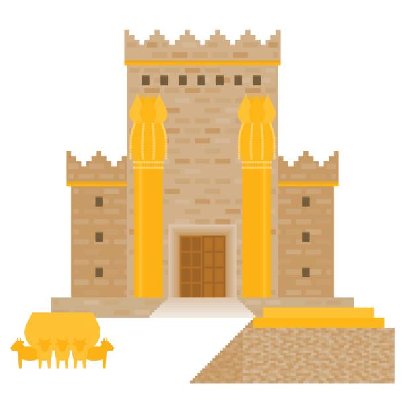 Entry into the temple requires purification at
Entry into the temple requires purification at
the Brazen Altar & Brazen Laver in the courtyard
Visions and Heavenly Voices
Do you desire to hear the Voice of Yahweh and so know His perfect will for your life? Do you want to know what is in your book of assignments recorded in Heaven? Do you want to be able to pass through the world's judgments unharmed and justified as a faithful servant too? Do you want to be a part of the first resurrection and inherit the millennial world? Each vision seen "in heaven" is marked by heavenly voices and it is in these we must look for the key to judgment scenes which follow on earth. We are obliged, therefore, to give more attention than is usually done to the significance of these utterances - weigh their words, learn their lessons, and note their bearing on what follows "on earth".
"Every time the Zoa (Seraphim) glorified and honoured and gave thanks to the One sitting on the throne, who lives for ever and ever, the twenty-four elders prostrated themselves before Him to worship the One who lives for ever and ever, and threw down their crowns in front of the throne, saying, 'You are our Yahweh and our Elohim (God), You are worthy of glory and honour and power, because You made all the universe and it was only by Your will that everything was made and exists" (Rev.4:9-11, JB).
Conclusion
Thus, creation is the subject of the first great utterance of the Zoa/Seraphim and the Elders. Their words announce the blessed fact that the judgments which are about to take place, have for their great object the removal of the curse caused by the Fall, and of all unholiness from the earth, and the ending of creation's groaning and travail. And I can't wait for that day of cleansing when we can return to the earth in resurrected bodies and receive our inheritance! Until next week, when we will be moving on to chapter 5, Yahweh bless you all in Yah'shua's (Jesus') Name. Amen.
Continued in Part 23
Acknowledgements
[1] Tom Wright, Revelation for Everyone - The New Testament for Everyone Commentary Series, Vol.19 (SPCK, London: 2011)
[2] E.W.Bullinger*, Number in Scripture (Kregel Publications, Grand Rapids, Michigan: 1967)
[3] E.W.Bullinger*, Commentary on Revelation (Kregel Classics, Grand Rapids, Michihan: 1984)
[4] E.W.Bullinger*, The Companion Bible being the Authorized Verion of 1611 with Structures & Critical Explanatory Notes (Samuel Bagster & Sons Ltd., London: 1974), pp.1883-1914
*E.W.Bullinger was a brilliant Anglican clergyman and scholar whose works merit careful study by serious students of the Bible. He was, however, seriously in error in at least three main areas, namely, (1) he believed the 'Church' has been raptured before the Book of Revelation opens, (2) he believed that the 7 churches in Revelation 2-3 are 7, literal Jewish churches or assemblies yet to come, and (3) he believed in a pre-tribulation, pre-millennial rapture.
 Click the image for the whole Series
Click the image for the whole Series

 V356
V356
|


